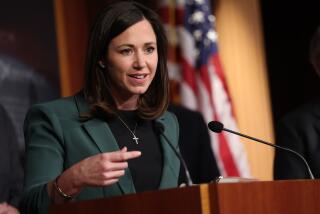Opinion: Bad in bed? Millennials can work with that — just as long as you’re not a Trump supporter
In the Trump era, the desire for great sex appears to have taken a back seat to fears about lousy pillow talk.
According to internal data the dating service OkCupid provided, its millennial users overwhelmingly care more about their partners’ politics than how good they are in bed. In the nation’s capital, 70% of millennials would prefer romantic partners who shared their political opinions than their sexual proclivities. In Chicago, Portland, Brooklyn and Philadelphia, the majority of millennials are more invested in a partner’s position on climate change than their preferred position in the “Kama Sutra”.
What gives?
Last year, we learned that younger millennials are having astonishingly little sex to begin with. Despite our reputation as the hookup generation raised on a steady diet of sexting, we’re having about half as much sex as Gen Xers did when they were our age. So it could be that millennials don’t prioritize sex; that we, as supremely enlightened beings, care more about cultivating an intellectual connection and shared values than finding a partner equipped with a six pack and a filthy imagination.
But I doubt it.
It’s more likely that we can no longer stand to talk to, let alone sleep with, those on “the other side.” Flirting across political lines in this climate feels as sexy as squeezing an electric fence.
“I believe your former candidate belongs in federal prison,” he says, lightly placing his hand on hers. “I’d give my right leg to see your president impeached,” she replies, batting her eyelashes.
If we must choose between mutual respect and mutual orgasm, the former’s a natural choice.
This kind of friction is hot in theory; it works in rom-coms like “You’ve Got Mail” or classics like “Pride and Prejudice.” In real life, however, these would-be couples tend to split the check, retreat to their soft and insulated corners of the internet, and delete each others’ numbers.
Democrat James Carville and Republican Mary Matalin are held up so often as an aisle-crossing couple because such unions hardly ever happen. Plus those two got together in the early ’90s, when political opposites hated each other considerably less. This isn’t anecdotal; a recent Pew study shows that the partisan gap on political values has never been wider and, perhaps more significantly, antipathy between the parties is immense. Forty-four percent of Democrats and left-leaners have a “very unfavorable” opinion of the right; 45% of Republicans and right-leaners have a “very unfavorable” opinion of the left. In 1994, fewer than 20% of the members of either party viewed the other very unfavorably.
From 2015 to 2017, the percentage of OkCupid users who mentioned political words in their profiles increased more than 1,000%. From 2016 to 2017, the use of the word “feminist” increased by 26% and “women’s rights” increased by 73%.
As Orlaith Farrell reported for CNN:
On two of the main dating apps used by New Yorkers – Tinder and Bumble – you swipe right if interested in the person (and hope they do too, for a match) and left to reject the candidate. Frequently, the people I came across seemed interested in steering clear of anyone who supported Trump. “Swipe left if you voted for Trump,” I’d see on one profile. Other versions included “If you voted for Trump, we shall not hump” and the less rhythmical, more brutal: “If you voted for Trump, swipe yourself off a cliff.”
OkCupid isn’t fighting this phenomenon; it’s harnessing it. After introducing a “Trump filter” and partnering with Planned Parenthood, the company has rolled out new ads that wink at the political gulf between its users. “DTF” is an oft-used millennial acronym that stands for “Down To [Fornicate].” (The actual word’s an unprintable synonym.) The company’s punchy slogans replace that final word with phrases like “Filter Out the Far Right” or “Fight About the President.”
In theory, I hate this. I deeply want us all to get along and have long, respectful dialogues while cuddling on sofas made of cotton candy. In real life, the days are short, hectic and, frankly, terrible. Can’t a woman grab a cup of coffee with someone who respects her right to make her own reproductive decisions? Why would we opt to see a movie with a person who thinks guns and elementary schools go together? Why would any woman choose to dine with an individual who wants to deport her family?
All that said, it would be very cool if our dates were also fantastic in bed. But if we must choose between mutual respect and mutual orgasm, the former’s a natural choice. (The word “respect,” for that matter, increased by 19% on the service’s platform last year.)
Filter: on.
Melissa Batchelor Warnke is a contributing writer to Opinion. Follow her on Twitter: @velvetmelvis.
Follow the Opinion section on Twitter @latimesopinion and Facebook
More to Read
A cure for the common opinion
Get thought-provoking perspectives with our weekly newsletter.
You may occasionally receive promotional content from the Los Angeles Times.







